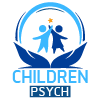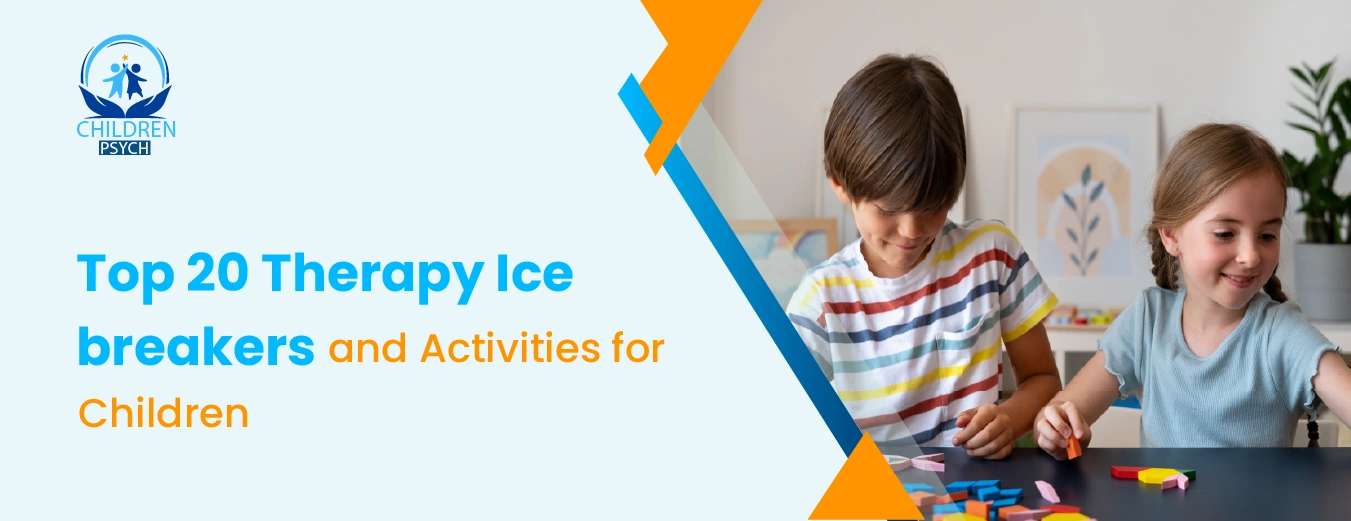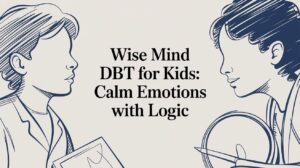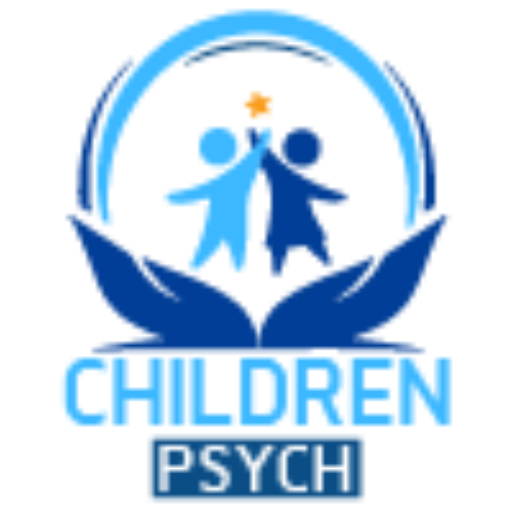Therapy icebreakers and activities for children are the fun, engaging, and creative games, activities and discussions that help the children to create a sense of rapport and encourage them to participate in therapy sessions. Icebreakers help the children learn social skills and ways to communicate with each other and overcome mental issues.
If you want to know more about icebreakers and what are the top therapy icebreakers and activities for children then read this article. You will also completely understand the benefits of icebreakers for children’s mental health. So let’s dive in!
Therapy ice breakers and activities for Children to promote their mental health
In any therapy setting, the main goal of each therapist is to develop a rapport, which is a sense of trust, comfort, and understanding with the participants who can be children, adolescents, or adults. As children require more confidence and support to share their emotions, experts utilize various therapy icebreakers and activities for them to develop a welcoming environment where they feel comfortable and secure, speak their hearts out, enhance their social skills, and overcome their common mental issues, such as anxiety and depression, etc.
Therapy, icebreakers, and activities for Children are the best strategies to engage the children in therapeutic settings in a fun and engaging way where they communicate with each other, know each other, learn multiple skills, and acquire emotional awareness. These involve highly specialized, creative, and engaging activities or games such as Jenga, two truths and a lie, human knot, show and tell, emotion cards, and scavenger hunt etc.
Top benefits of therapy icebreakers and activities for children
Therapy icebreakers and activities for children offer a range of benefits, which are as follows:
-
Developing a sense of rapport
Icebreakers help the children to know each other and develop a sense of communication and belonging. Human Bingo and two truths and a lie are the top icebreakers in creating a rapport. At the start of the session, experts develop a protective environment where each child feels free to communicate, develop trust in each other, and learn strategies to deal with common mental issues.
-
Enhanced social skills
Icebreakers or activities play a significant role as they help the children to learn as well as practice social skills. They participate in different individual or group therapy icebreaker activities and get the chance to communicate with each other. In this way, they learn the best ways to increase their emotional intelligence and learn communication and social skills.
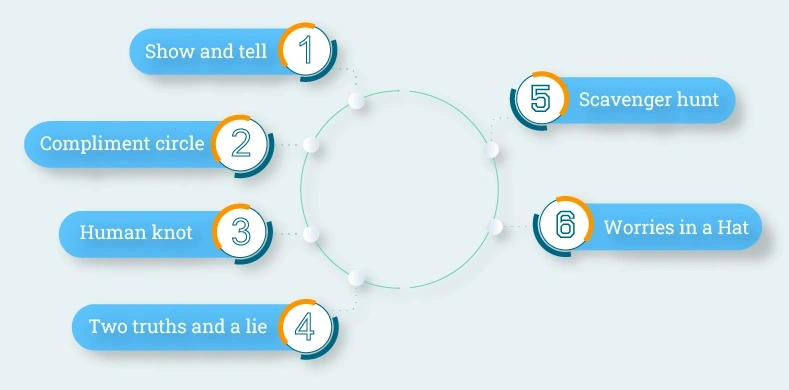
-
Increased self-awareness
Childhood is the main phase that involves the self-exploration of thoughts and emotions. Therapy icebreakers and activities help the children to focus on their thought patterns and emotions. In addition, they also learn the ways to bring out their inner potential, strengths or weaknesses. Their increased self-awareness helps them to move on the pathway of self-growth and development. Moreover, this also makes them capable of building stronger bonds with their loved ones.
-
Increase self-esteem
Icebreaker activities are also useful in increasing the self-esteem of children. They start making efforts to navigate the challenges with a positive self-image and mindset. As they get benefits from their efforts, their confidence and self-esteem get increased and they feel more urge to work hard and excel in each phase of their life.
-
Improved communication skills
Most of the children have difficulty in communicating with their friends or loved ones and expressing their feelings and emotions to them. But with the help of therapy icebreakers and activities, they gain self confidence and communicate easily to express themselves without any barrier. This not only improves their communication skills but also diminishes their sense of isolation. They start engaging in each social activity and exhibit their inner skills to achieve success.
-
Better emotional development
Icebreakers are also effective for improving the emotional intelligence of children. They learn the ways to manage their emotions and thoughts and of others. In addition, they also identify their negative thought patterns and replace them into positive ones.
Top 20 therapy Icebreakers and Activities for children
The following is a list of the top 20 therapy icebreakers and activities for children.
-
Show and tell
Show and tell is an icebreaker in which the therapist asks the child to bring their favourite item to a group and explain their importance in front of others. That object could be any jewelry item, pet, bag, special gift from a friend, or any other thing that holds great significance. This icebreaker encourages the children to share, listen, and understand their own and the feelings of others in a highly fun and creative manner. In addition, it also teaches social skills that help in social contribution.
-
Compliment circle
As the name indicates, this icebreaker game involves giving compliments. Children sit in a circle and give compliments to each other on their turns. This is ideal for developing a sense of positive interaction with each other, along with elevated confidence and self-esteem.
-
Human knot
Human knot is an icebreaker activity in which children sit together and form a closed circle. Then they lift their right hand in an upward direction and then hold the hand of another child across the circle. It’s just like forming a hand knot. Then they are asked to break their knot without leaving the hand of each other. This activity not only highlights but also fosters the sense of motivation, teamwork, and communication among each other.
-
Two truths and a lie
Two truths and a lie is a most popular and highly effective icebreaker game for children. Experts ask the child to say three statements about themselves, in which one is based on fact and truth, while the third one is a lie. Then another child or participant is asked to guess which stat is true and which one is wrong. This activity helps the children to focus on their minds and show their inner skills, which helps them in overcoming any difficult situation or any mental issue that they are dealing with.
-
Scavenger hunt
This icebreaker activity is useful for those children who are in the initial days of school. They use this to get to know each other and develop a stronger bond with each other. In this activity, children develop a list that includes a category, topic or questions. After creating that list, they pass this list with each other and then check who fits the needs or requirements of the list.
-
Worries in a Hat
Children dealing with any mental issue always find a secure environment and mental support to completely express themselves. In this icebreaker, experts develop a friendly environment where children share their mental worries without any fear. Each child then openly shares their feelings, participates in a discussion, and ultimately learns varied things.
-
Get to know you, Jenga.
This icebreaker activity helps the children connect and overcome barriers. The names of different things are mentioned on the Jenga blocks. Experts ask the children to select one Jenga block and then ask a question from another participant related to the topic mentioned on the Jenga block. For example, if the topic is superpowers, then children can ask ‘’Who is your superhero’’.Likewise, if the topic is sports, then the question could be ‘’What is your favourite sport?’’
-
Family picture
This icebreaker involves making drawings of the family members on a blank paper. Both the therapist and the children draw the image of their family members and then explain them on their turn. This activity helps in developing social skills and fostering a sense of communication.
-
My Superpowers
Each child has some hidden capabilities that can help them excel in their life. This icebreaker activity helps the children focus on their imaginary world and express themselves by considering their inner hidden superpowers. Experts ask the children to consider themselves superheroes and explain their superpowers to others. In addition, they also ask some questions of them like ‘’What kind of superpower do you want to have?’’
-
Human Bingo
Human bingo is an icebreaker activity that encourages the interaction of children, which helps them to know each other and learning multiple social skills. This activity is widely used in classroom environments where teachers ask each child to write their traits or characteristics on bingo cards. For example, ‘’I love music’’I can speak more than one language’’ or ‘’I have pets. Then, each classmate is asked to guess the traits of the others
-
Mandala making
Mandal making is another way to promote the social-emotional learning of children. Children are asked to develop their mandala by using varied shapes and colors. In addition, they can also use other items such as shells, beads, and rocks etc. Then experts ask the children to express different aspects of their personality by using the mandala. Other than traits, they can also share their personal life achievements as well as things that they love the most.
-
Uno
Uno is also a significant icebreaker, which involves the colorful cards that children play with and ask different questions to each other. This game involves different rounds, and on each round, they add a card to their hand or move them one after the other. When they move the card down with a number placed on it, they are asked to answer the question associated with that number and color.
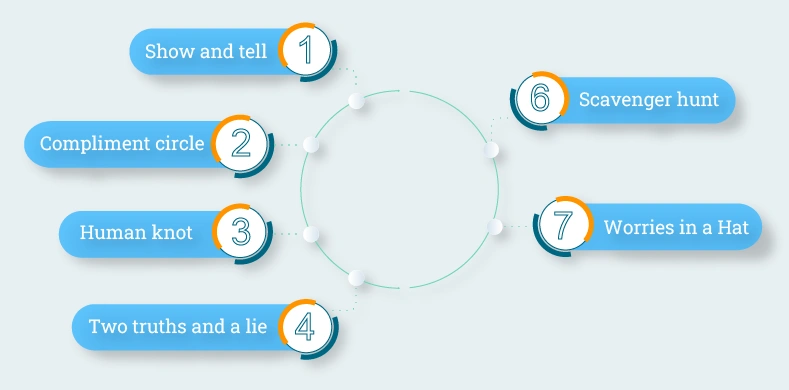
-
Name game
Name game is another icebreaker game that favors the increased engagement of children in different activities. All the children stand in a circle, and then one child who is at the front of the row starts saying their name louder. Then the next child repeats the name of the first child and then adds their name. In this way, they not only remember the names of each other but also learn communication skills.
-
Common ground
Common ground also works for developing a sense of rapport. Children are asked to identify those things that are common among them. This could be any trait or any habit.
-
Charades
All about me charades is another fun icebreaker activity for children. Experts, along with children, tell each other to draw images of their favourite game, series, or anything, but in a secret manner. After completing the drawing, they act out each image drawn on paper without uttering a single word and the second person has to guess that.
-
Talent show
This icebreaker involves showing the talent of children to each other. Children are instructed to draw pictures of three things that they think they are good at or their special talent. By doing this, they get the chance to show their inner skills and also develop confidence.
-
Gratitude journal
Gratitude is one of the best acts that encourages the occurrence of positive thoughts in the mind. Making a gratitude journal is also a fun and engaging way that helps children develop their positive self-reflection skills. In this icebreaker activity, children are asked to make a journal in which they write one thing they are grateful for. Then they share that paper or card with other group participants.
-
Juggling thoughts
Juggling thoughts is considered the best way to enjoy the present with mindfulness and avoid distraction from the mess of unwanted thoughts. In the activity, experts ask the children to stand in a circle and pass certain things to each other. They instruct to keep adding things and move in a circle.
After a few seconds, they stop their movement and ask them to explain how those objects represent or express their cluttered thoughts. Then they are asked to increase the speed of moving in a circle and do the same. By doing this, they get the chance to stay in the present with focus and concentration and stop being overwhelmed with disturbing negative thoughts.
-
Role playing
Role playing is a famous icebreaker activity that helps children in learning problem-solving and conflict resolution skills. Therapists develop a serene and friendly setting where they share everything without any fear of judgment. In role playing, different characters are assigned to children and then get the instructions to interact with each other according to their assigned roles.
This helps the children to leave their comfort zone, come forward and participate in their character based discussions in a fun and engaging way.
-
Building blocks
Building blocks are used to encourage children to actively participate in those activities that require teamwork. They are guided to develop a single structure from multiple parallel structures.
Children Psych: The Ideal mental support that your child needs to thrive
Children Psych is a top platform that offers the best psychiatric services for children and adolescents. Our team of child psychiatric nurse practitioners develops the tailored solutions that cater to he mental health requirements of each child. So if you are concerned with the mental welness of your young one, then schedule a consultation with our experts and find the best mental health solutions.
Frequently Asked Questions
What are the 4Cs in an icebreaker?
The 4 C in icebreaker represents the color, cartoon character, car, and cuisine.
What are group therapeutic activities for kids?
The most common and productive group therapy activities for kids include making a journal, mandala making, truth and name game, etc.
What are the men's health icebreakers for adults?
For adults, the most common mental health icebreakers include fun and engaging games, reflective questions, as well as some other activities.
Which icebreaker activities are involved in individual therapy?
Show and tell, two truths and a lie, after one of those icebreakers that are involved in individual therapy.
What are the common fun icebreaker questions for therapy?
The most common, fun, and engaging icebreaker questions for therapy include:
If you could get a chance to invent any holiday season, then what would it be?
What animal do you think represents your personality?
If your life is a movie, then what would be the name?
